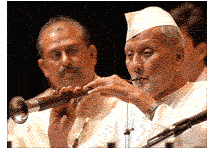
Ustad Bismillah Khan 
Legendary shehnai maestro Ustad Bismillah Khan, the doyen of India 's composite culture (Ganga-Jamni tehzeeb) and a foremost ambassador of the spirit of popular harmony and the great musical heritage of India , passed away on 21 August 2006.
Born on 21 March 1916 in a family of shehnai-players in the princely state of Dumraon in Bihar, Bismillah shifted to Benaras at the age of six to live with his uncle Allah Baksh ‘Vilayati' who was attached as a shehnai-player to the Kashi Vishwanath temple on the bank of the Ganga. At an early age of 14 he played shehnai at Allahabad and Lucknow in music conferences and shot into prominence in 1937 at the age of 21 when he played shehnai at All-India Music Festival held in Calcutta . His most memorable performance, in his own words, was “playing ( Raag Kafi ) on the ramparts of Red Fort on 15th August 1947 with Pandit Nehru and host of dignitaries listening”.
He was anguished over the way decline in the classical music has set in in our country. He said given the way things had been moving, the time would not be far away when for listening to our classical music we might have to go abroad.
Bismillah Khan had profound emotional attachment to the soil of Benaras. Once when he was offered all amenities and even citizenship during a concert in Europe , he refused all of that and instead asked his admirer ‘can you get me ‘Gangaji', the river which flows near my home in Benaras?'.
Recipient of many awards and honours including the highest in the country, Bismillah Khan's exceptional quality lay not only in the fact that he was the pioneer who elevated shehnai to its present position in classical music, but that with his shehnai he symbolised the composite culture (Ganga-Jamni tehzeeb) of our country. This is the reason that Shehnai became synonymous with Ustad Bismillah Khan. He gave classical music a whole new dimension by assimilating many folk tunes.
Ustad Bismillah Khan was firm in his belief that music could never be confined to the limits of any specific religion. According to him, music has a humanizing effect, and it cannot be divided into a Hindu humanity and a Muslim humanity. A devout Shia, Bismillah Khan used to say: “the seven shuddh and five komal surs are my namaaz.” He would also say, “I have worshipped music at the temple of Shiva … and I hold Saraswati as my Goddess of Music”.
Bismillah Khan used to say that Music makes man a ‘fakeer', who endeavours for the well-being of all and for the creation of a better world. Commenting on the contemporary musical scene, he used to say that music must be saved from going out of tune; it must be made tuneful and melodious. Commenting on the Western modern fast music in contrast to the classical he said, “proponents of Western music say that classical music has been playing on the same ragas for hundreds of years, whereas modern music generates newer tunes everyday; so classical music would die down some day. But I say: the fact is just the opposite. Today we do not play the same Raag Basant that our forefathers used to play. There is a sea of difference between the two. Every great musician catches the tune, melody, and ragas of his own times, and imparts a truly humanizing quality to them … However, I do listen to Western music, modern fast music, to find out if anything could be assimilated into the classical.”
Talking about the official attitude towards music and musicians, Bismillah Khan would occasionally narrate an episode when at a concert while he was playing shehnai, Pundit Jawaharlal Nehru had fallen asleep. “I thought, he must be very tired; it's worth if I could help him sleep with my music,” the shehnai maestro would say. About awards and prizes he used to say that in place of all this the government should just make necessary arrangements for the artistes' livelihood. At least, the government should provide them with ample opportunities on All-India Radio and Doordarshan and give them honorarium for that. Secondly, he held that there must be something wrong with the way music was being taught in our universities because they never produced a musician of calibre, and it must be rectified.
It is a matter of shame that after the death of the shehnai maestro, the governments of UP and Bihar as well as the government at the Centre are now busy making all kinds of posthumous announcements to cash in on the wave of popular respect for this great musician, while Bismillah Khan lived in poverty earning bread for his large joint family with his own ‘breath'. How long would great talents continue to be treated like this?